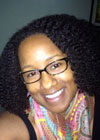| Opening Session |
 |
Our Mathematical Stories: Identity, Community, and Connections
Kaneka Turner
How and what brings each individual to any given community is intriguing. We all have a story. When I look back over my math journey, I am often left in awe wondering how I got here. The more I settle in, the more curious I become about other members of our math community. So, what are our math stories? Who is in the room, and how did they get here? My goal in this conference is to find out. I cannot wait to connect with you. |
 |
What Good is Productive Struggle without Joyful Engagement? Motivating Students through Playful Mathematics.
Ilana Horn
Recent efforts to get children to think deeply about mathematical ideas have focused on productive struggle –– the idea that teachers need to help students persist with challenging ideas to understand them. While struggle may be important to learning, it misses the motivational possibilities of mathematical play. I support this claim through a study we conducted following children through a mathematical playground. I pay special attention to the activity of children who disliked school math yet sustained their attention at the playground. |
 |
My Journey from Worksheets to Rich Tasks
Michael Fenton
Lecture. Practice. Homework. Wash, rinse, repeat. For years I was stuck in this uninspiring cycle. I knew there was more, but I had trouble letting go of my example-centric approach. I'll share the lessons I've learned thus far in my ongoing escape from monotony, from the big picture of "Why" to the nuts-and-bolts details of "What" and "How." |
Featured Sessions
|
Developing Unique and Effective Student-Driven Math Lessons
Jessica Solano
Discover how to boost student achievement with student-driven math lessons! Students will gain true ownership over their learning by being challenged by a real-world task then reaching a solution by building on previous learning, their intuitive observations, and thought-provoking questions from the teacher to guide them towards mastery. |
Creating Access to Mathematics By Eliminating Barriers
Nitzeida Clare and Andrew Gael
Accessibility is an essential component in creating equitable opportunities for students learning math in self-contained, resource and inclusion classrooms. This session will explore the areas of cognitive functioning and barriers students face in math class. Lesson planning protocols will be introduced as a means to help eliminate those barriers. |
Not Just Answering Someone Else's Questions: Making Math Class More Like Mathematics
Tracy Johnston Zager
Mathematicians say mathematics is full of wonder, discovery, and curiosity. Most students use different words to describe it. I've studied the discipline of mathematics and the realities of math classes, seeking out colleagues who close the gap between the two. What can we learn from teachers whose students ask and answer their own math questions? |
Assessment: The Bridge between Teaching and Learning
Dylan Wiliam
Good teaching starts from where students are, not where we would like them to be. But students do not learn what we teach. That is why assessment is the key to effective instruction. Only by assessing, can we find out whether students have learned what we intended and this presentation will outline the five key strategies of effective assessment.
|
Using Digital Tools to Give Every Student a Voice
Cathy Yenca
Simply put, we value student thinking. Technology tools that help us gather, examine, and share students' mathematical thinking inform our instruction and help create a growth-mindset classroom culture. Bring a tablet or laptop, and be ready to wear your "teacher hat" and "student hat" as you experience strategies to try in your own classroom. |
The DIY Math Curriculum: Simple Tricks to Make Creating Your Own Material Feel Less Onerous
Bowman Dickson and Sameer Shah
Don't like the way the textbook approaches a concept but are intimidated by creating your own content? Bowman and Sam both write their own content from scratch. We'll share the simple lesson-design tricks we use to write investigations that lead to vibrant discussions and a-ha moments. You will leave ready and excited to write your own content! |
From Counting to Calculus: What Stays the Same?
Christopher Danielson
We tend to think of the work of calculus students as being very different from that of kindergarteners, but it really shouldn't be so. All learners can function as mathematicians. We'll examine this claim through tasks and student ideas across the K-12 curriculum. |
3-Act Tasks: Filling the Void of Mathematical Modeling in the Elementary Grades
Graham Fletcher
As elementary educators we've misinterpreted the term "model" as simply the use of manipulatives. This is causing our students to miss the mark when it comes to modeling with mathematics. Through the use of 3-Act tasks we will explore what mathematical modeling is, what it looks like, and how we can support this work in our elementary classrooms.
|
Stepping Towards Algebraic Thinking with Patterns and Non-Routine Problems
Carl Oliver
Prime your students for algebraic thinking by helping them identifying patterns in a structured and function-minded way. Take their intuitive drive to "find the next step" and funnel it into developing the mathematical practices needed to succeed with non-routine problems. Plant the seed for ideas students will explore in Algebra 2 and Calculus. |
Honoring Student Identities: An Examination of American Indian Blood Quantum
Kassie Benjamin-Ficken
Math has been and continues to be used to help us better understand our world and surroundings. Participants will examine this notion through a study on Blood Quantum of American Indians. This session aims to acknowledge the many identities of our students and how to best reflect and empower those identities within a math setting.
|